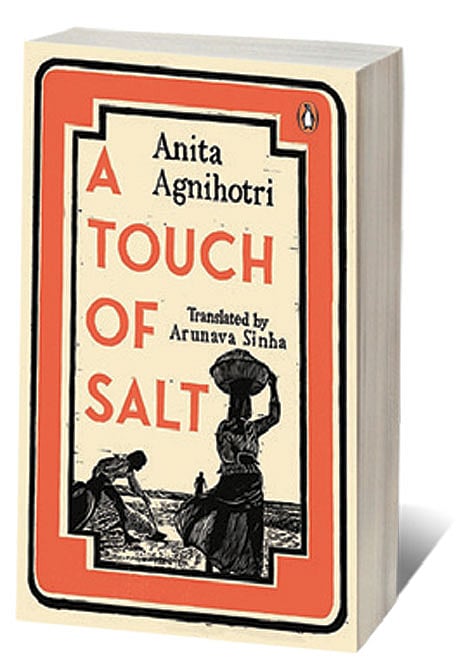Salt and Sand

ANITA AGNIHOTRI (born 1956) is pre-eminent among contemporary Bengali writers not only for her prolific output and social consciousness, but also for the rich life experience she brings to her fiction, poetry and essays. As a retired IAS officer, her material is as vivid and authentic as it gets. Travelling into the far corners of India, Agnihotri has explored lives on the margins—of the poorest of the poor living in Odisha and Chhattisgarh in her much-lauded novel, Mahanadi, for instance.
In A Touch of Salt, first published in Bengali in 2022 and recently translated into English by Arunava Sinha, the writer takes us into another neglected corner of India: the Rann of Kutch in Gujarat, where the Agarias (one of independent India’s denotified tribes) have lived for generations.
Although bulldozed by the machinery of progress in 21st-century India, the Agarias have performed a key role for over a century. This community’s profession has been to make salt out of seawater in a region that supplies 40 per cent of India’s salt needs.
Occupationally, salt-farming is hazardous and exploitative. The Agarias not only need to toil during the blazing summer months, but they must also spend their paltry income to buy water from tankers. Their makeshift homes barely protect them from the elements, and mortality rates are high among the men.
“Wading through saline water and earth every day has atrophied their calves beneath their knees, while a lifetime of salt gathers in the marrow,” we read. “This is why when a salt farmer dies, his torso burns on the pyre, but not his legs. The family proceeds to separate the legs from the ashes and unburnt remains of the body before burying them underground.”
It's A Big Deal!
30 Jan 2026 - Vol 04 | Issue 56
India and European Union amp up their partnership in a world unsettled by Trump
As an account of the hardship of the Agarias’ life, Agnihotri’s novel is deeply moving. There are glimpses into oddities, like schools run on buses, which gives a texture of intimate truth to her storytelling. But what gives A Touch of Salt a rare edge is its ability to forge a link with the larger forces of history—the Dandi March undertaken by MK Gandhi in 1930, for instance, to oppose the draconian salt tax imposed by the British.
In a brilliant sleight of hand, Agnihotri takes the reader back to the original context of the march, rooted in Gandhi’s politics of non-violence and satyagrah. A meticulously strategic move, with its route chosen with deliberate care, the march saw a few handpicked men join this rebellion against the British. The presence of women, Gandhi held, would merely show up the marchers’ “cowardice” before the rulers. “History, of course, has recorded Kasturba’s contribution [in rousing the country during the Dandi March] in invisible letters,” as Agnihotri writes. More tragically, not a single member of the Agaria community, who sacrificed their lives at the altar of salt production, was included in this grand gesture of protest.
It is at this point that Agnihotri brings in Tribhuvan, a slip of an Agaria boy, who flees his parents during the salt-making season to join the march. Through his eyes we bear witness to the symbolic journey, ending with Gandhi holding up a handful of salt. Yet, “the story of Tribhuvan’s satyagrah,” Agnihotri writes, “of his march for his dharma, was not written anywhere.” Passed on as part of the Agaria lore, it remains an ironic footnote in 21st-century India.
Braided into this reimagining of the Dandi March is the story of Tribhuvan’s grandson Azad, who continues to fight for his people in new India. As the state confers the status of reserved forest on swathes of the Kutch, the Agarias are reduced to encroachers, erased from their own land. It’s the same old story, told by just another actor. As Nilesh, an activist, tells Azad, “Do you think anything has changed...? Some of the methods may be different, but the way the government considers any protest a conspiracy to oust the state has not changed.”

